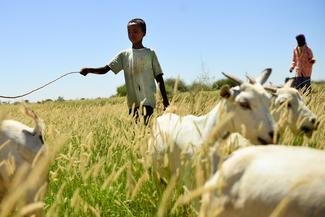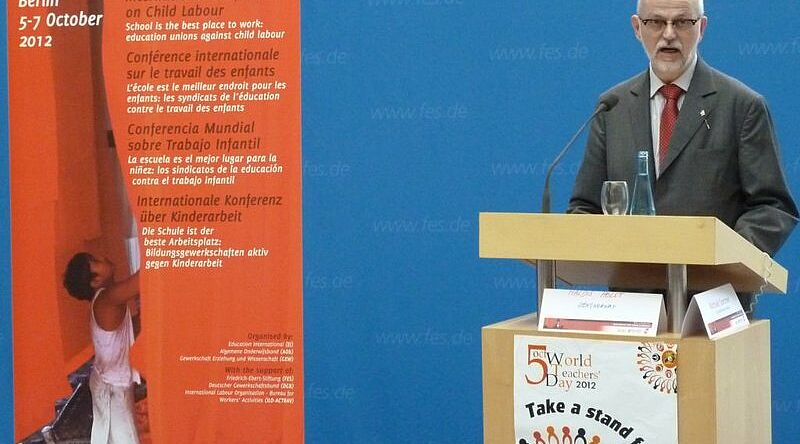
Peter Dörrie
Freelance journalist and analyst, Münster
A bicycle as an attractant – child labor and child trafficking in cocoa farming
For many children in Germany, there is no better gift than a bar of chocolate. In contrast, in the West African country of Ivory Coast, children often have mixed feelings about cocoa. Because here, where every third cocoa bean is harvested worldwide, child labor on the cocoa plantations is still the norm.
Around 800,000 children work on Ivorian cocoa farms. They harvest cocoa pods, weed, care for the trees, remove beans from the pod with machetes and are involved in the first processing steps that turn an inconspicuous bean into the ultimate candy. This work is not exploitative in every case – in Germany, too, many children help out in agriculture or in family businesses. But for more than a quarter of a million children, working in the cocoa fields is so difficult or dangerous that it is actually prohibited by international agreements and the laws of the Ivory Coast.
In a report by the British organization Anti-Slavery International, for example, a young adult who started working on a cocoa plantation when he was 14 said that he had to work nine hours a day. This included carrying the heavy sacks full of cocoa beans. The removal of weeds and undergrowth between the trees is particularly dangerous: many children injure themselves with the sharp machetes and poisonous snakes often lurk in the bushes.
In a study by the Payson Center for International Development in the United States on the situation in the Ivorian cocoa sector, half of all children reported that they had injured themselves at work in the past twelve months. Four out of five complained about carrying too heavy loads, and the massive use of pesticides in the fields also poses significant health risks.
Children who do not work for their own parents are particularly disadvantaged. The boys affected by this only go to school to 40 percent, girls even less. A total of almost 150,000 children work in the Ivory Coast on the cocoa fields of other families.
Not all of these children are involuntarily there. In many African countries it is common for children to stay with relatives if this can ensure school attendance or better care. However, there are still many cases of forced labor and child trafficking in the Ivory Coast. Around 20,000 children who work here come from other countries. There are no reliable figures on how many children from the Ivory Coast themselves become victims of child traffickers.
Children are deceived and exploited
Child trafficking takes on very different forms. Children from the northern neighboring countries Burkina Faso and Mali are most affected. In some cases they are lured with promises and voluntarily join the child traffickers without the knowledge of their parents. For example, a child from the Burkinabe town of Letiefesso reports that an intermediary had promised him a bike and that he therefore traveled to Ivory Coast at the age of nine without his parents’ consent.
According to Anti-Slavery International, instead of receiving the hoped-for bicycle, the child ended up in conditions that are reminiscent of slavery: “I only remember suffering. I was told that I could easily make money there, but I was deceived. It was too hard for me to cut the grass with the machete to cut and I had neck pain from knocking the pods off the trees with a long pole. At night it was difficult for me to sleep because of the pain and we had to get up at 4:00 and work until 4:00 p.m. I was always tired."
In other cases, children are kidnapped. In Burkina Faso, there was a case last year in which police officers found several drugged children on a bus. Some of the children died as a result of the drugs. It is believed that the children should be smuggled to Ivory Coast for work on cocoa plantations.
Sometimes parents agree to trade with their children, but rarely with full knowledge of the consequences for the child. Many families in Burkina Faso live on the margins of subsistence and feed on subsistence farming. If the rain fails to appear and crop failures occur, which is happening more and more due to climate change, many families will go hungry. The Ivory Coast still has a reputation for making money there easily. Some parents believe the promises made by child traffickers that their children will be better off there and that they may even be able to send money home.
The cocoa farmers earn too little
But the prices for cocoa on the world market – adjusted for inflation – have halved since the 1980s. This drop in prices is a reaction to the massive expansion of cocoa production at that time, which was also subsidized by the state in the Ivory Coast. Cocoa trees take several years and significant investments on the part of the farmer to reach their full productivity. When prices started to drop in the 1990s, many farmers simply couldn’t afford to switch to another fruit.
There was little support from the government and the food companies in the north were happy about the cheap world market prices. For farmers, who often receive less than half of the world market price, this development meant slipping into absolute poverty. The employment of adult harvest helpers was soon reduced few Afford small farmers. “An adult harvest worker from Burkina Faso costs around $ 250 a year plus meals, but a child only costs half", said Friedel Hütz-Adams, cocoa expert at the Südwind Institute in Siegburg.
This creates a dilemma for the government of the Ivory Coast and the northern corporations: no one wants to be held responsible for exploitative child labor and child trafficking. But the cocoa industry is happy about the low world market prices. And the Ivorian government relies on the income from the cocoa trade.
In the past, the actors involved therefore tried above all to take action against the phenomenon of child trafficking and child labor with information campaigns and better training for farmers – with limited success. Practically everyone involved knows that it is better for children to go to school than to do hard work. It is the economic situation that does not allow cocoa farmers to put this knowledge into practice.
That is why a current initiative of the Ivorian government is of particular importance: For the first time since the last harvest season, the government has guaranteed all farmers a fixed purchase price for their harvest. Ivorian farmers get 750 francs CFA per kilo of cocoa beans, which corresponds to around 1.13 euros, a good 50 percent of the current world market price – an important first step in order to ensure decent income for cocoa farmers, which must be followed by others. In doing so, the government is putting an end to the harmful practice in which middlemen were able to offer farmers ridiculously low offers at certain times when cocoa was in abundance after the harvest.
In an interview with Südlink, Ivorian Prime Minister Daniel Kablan Duncan is optimistic: “We are working on the regional level to abolish child labor. To do this, we want to further increase farmers’ incomes. Current we are striving for a minimum price of 60 percent of the world market price for the farmers, which is why we have just increased the payments from 700 to 750 francs per kilo. We are already seeing significant improvements in the sector."
Friedel Hütz-Adams sees no signs of worsening child labor or child trafficking in the Ivory Coast despite the recent price declines on the world market. In any case, the fact that the Ivorian government now recognizes the economic situation of farmers as the main reason for the practice of child labor is a positive development.
However, in order to not only stop the trend, but also to reverse it, industry and consumers also have to rethink: As long as in the north it is only ensured that raw materials such as cocoa are traded on the world market as cheaply as possible, child labor will continue to exist.
Peter Dörrie is a freelance journalist and specializes in questions of resource policy and security in Africa. Among other things, he lived and worked in Burkina Faso.
RELATED ITEMS
-
Child labor: child labor in Europe – human rights – history – planet knowledge
New section on child labor in Europe By Ulla Rehbein / Tobias Aufmkolk Oliver Twist and the pit children in English mines: Many people think of that…
-

Child labor worldwide, world vision germany
On this page we give you an overview of the most important information about child labor and approaches of World Vision…
-
Human rights: child labor – human rights – history – planet knowledge
New section on child labor Knotting carpets by Ulla Rehbein, hewing stones, slaving as house slaves, working in plantations – working all over the world…
-

What to do about child labor: gew – the education union
Many of the goods we consume every day are made by minors. But in the fight against child labor, teachers all over the world play a role…
